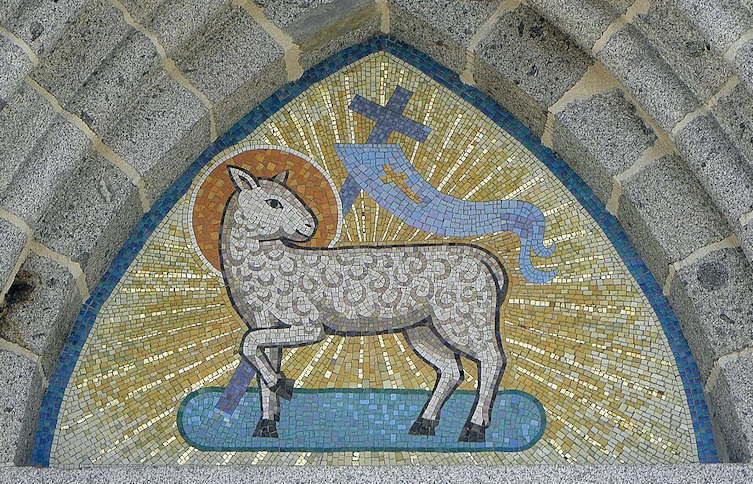
More classic art masterpieces used as illustrations on this site
TL;DR:
Revelation 21:23–24 offers a powerful image of world evangelism fulfillment: “The Lamb is its lamp. The nations will walk by its light.” This vision of people from every ethnic group walking in the light of Jesus (the Lamb) shows the result God's promise to bless all peoples through Abraham.

Commentary on Revelation 21
The next-to-the-last chapter of the Bible, Revelation 21, closes by alluding to world evangelism. That is powerful. A reference to world evangelism in Scripture's final pages trumpets the great importance God places on reaching all people with the Gospel!
To be sure, Revelation 21:23-24 is not an exhortation to us to finish the job. That's because it is a vision of the future. So, the phrase "the nations will walk by its light" celebrates the harvest that has been gathered from around the globe.
The Bible frequently uses light and darkness to contrast good with evil. Remember, for example, Jesus' bold proclamation: "I am the light of the world" (John 8:12)? That proclamation was strengthened when John wrote in Revelation that the Lamb of God would totally illuminate the New Jerusalem.
Not only that, John used his statement about the New Jerusalem's illumination to affirm that the gospel is for everyone on Earth. The Greek word in Revelation 21 that is rendered as"nation/nations" is ethnos/ethne. English words like "ethnic" and "ethnicity" come from that Greek word. Because of this, the Easy-to-Read Bible translation renders ethnos in Revelation 21:24 as "the peoples of the world." What powerful ramifications that has for the cause of world evangelism.
"Nations" in the sense of "ethnic groups" means the same thing as the "every tribe and language and people" phrase used earlier in Revelation 5:9, 7:9, and 14:6. People from "the nations" walking in the Lamb's light will wonderfully fulfill the promise God made to Abraham, Isaac, and Jacob: "All peoples on earth will be blessed through you and your offspring" (Genesis 28:14 as well as 12:3 and 18:18).
World evangelism has long been described as shedding light in dark places. Indeed, when Ada Blenkhorn and E. Meyer collaborated in the early 1900s to write a song about Africa's unreached people groups, they gave it the title "Dark Africa." Today, that title can seem derogatory or disparaging. It was not meant that way. That century-old song was written to awaken people to the lack of spiritual light for "the nations" of Africa.
In addition, we must not ignore the fact that Revelation 21:23-24 announces a fulfillment of the Isaiah 60:3 prophecy: "Nations will come to your light." These two prophecies -- one from the Old Testament and one from the New Testament -- will be fulfilled when believers carry out the Great Commission.
So, even though the prophecy in Revelation 21 appears descriptive, isn't it in some ways prescriptive for us? That is, shouldn't we be doing more than simply rejoicing that people from all over the world will be in the New Jerusalem? Revelation 21:23-24 grows out of every other biblical passage concerning our responsibility to share the Good News of the Gospel with every person on earth. As we work to carry out the Great Commission, we can rejoice that the vision of Revelation 21:23-24 is headed for fulfillment!
-- Howard Culbertson, hculbert@snu.edu
This blog on a world missions Bible passage is one of more than three dozen in the "Heart of God" series published in Engage, a monthly online magazine. That series looks at what the Bible says about world missions.
In John 8:12, Jesus is reported as saying, "I am the light of the world." So, it should be no surprise to read in Revelation 21 that the people groups of the world will walk by the light of the "Lamb." Revelation 21:23-24 may also be considered a fulfillment of Isaiah 60:1, 3: "Arise, shine, for your light has come . . . Nations will come to your light."
Revelation 21:23-24 declares, "The Lamb is its lamp. The nations will walk by its light." Those words point to the culmination of God's plan for salvation and redemption. The Lamb refers, of course, to Jesus Christ, who is often depicted as a sacrificial lamb in Christian theology. The reference to a lamp suggests illumination and guidance. The passage implies that the presence and teachings of Jesus will serve as the guiding light for all nations. This passage makes clear the universal significance of Christ's message. He offers hope and salvation not just to a select few but to people of all nations and backgrounds. Revelation 21:23-24 speaks to the idea that through faith in Christ, people everywhere can find enlightenment and direction that will lead them toward righteousness and eternal life.
Historical Note: A stone marker erected in China in the 8th Century refers to Christianity as "the Luminous Religion."